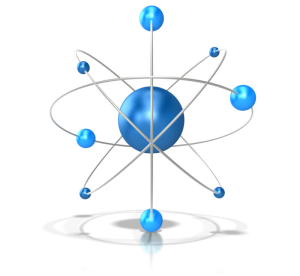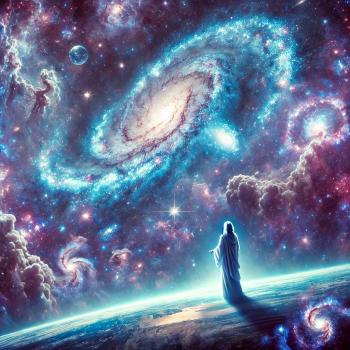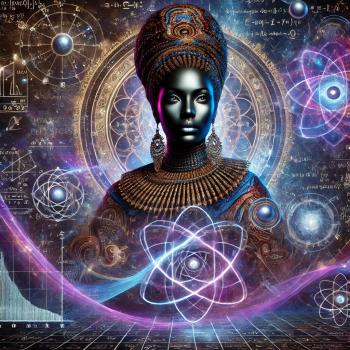 In the search for understanding life’s deepest mysteries, humanity has often turned to both religion and science. Religion offers ancient wisdom and moral guidance, while science provides empirical evidence and rational explanations. However, in recent decades, quantum physics has emerged as a field that challenges traditional religious beliefs while offering intriguing parallels to spiritual concepts. In this blog post, we will delve into why quantum physics may offer a more profound explanation for spirituality than religion does.
In the search for understanding life’s deepest mysteries, humanity has often turned to both religion and science. Religion offers ancient wisdom and moral guidance, while science provides empirical evidence and rational explanations. However, in recent decades, quantum physics has emerged as a field that challenges traditional religious beliefs while offering intriguing parallels to spiritual concepts. In this blog post, we will delve into why quantum physics may offer a more profound explanation for spirituality than religion does.
Quantum Mechanics: A Brief Overview
Before we delve into the connection between quantum physics and spirituality, let’s briefly review the key principles of quantum mechanics. At its core, quantum mechanics is the branch of physics that describes the behavior of subatomic particles, such as electrons and photons. Unlike classical physics, which is based on deterministic laws, quantum mechanics introduces uncertainty and probabilistic outcomes.
One of the most famous concepts in quantum mechanics is the principle of superposition, which states that particles can exist in multiple states simultaneously until they are observed. Another fundamental principle is entanglement, which describes the phenomenon where particles become interconnected regardless of the distance between them.
These concepts challenge our classical understanding of reality and open the door to profound philosophical and spiritual implications.
The Limits of Traditional Religious Views
Religious traditions around the world offer explanations for the nature of existence, the origin of the universe, and the purpose of life. However, many of these explanations are based on ancient texts and metaphysical concepts that may not align with our modern understanding of the universe.
For example, creation myths from various religions often describe the universe as being created in a linear fashion, with a distinct beginning and end. These narratives may conflict with scientific theories such as the Big Bang theory, which posits that the universe began as a singularity approximately 13.8 billion years ago.
Furthermore, traditional religious views often rely on supernatural explanations for phenomena that can now be explained through scientific inquiry. While these explanations may provide comfort and meaning to believers, they may fall short in addressing the complexities of the natural world.
Quantum Physics and Consciousness
One of the most intriguing aspects of quantum physics is its potential connection to consciousness. Some interpretations of quantum mechanics suggest that consciousness plays a fundamental role in the nature of reality. For example, the Copenhagen interpretation, proposed by physicist Niels Bohr, posits that particles only assume definite states when they are observed by a conscious observer.
This idea has led some researchers to speculate about the role of consciousness in the universe. Could consciousness be a fundamental aspect of reality, rather than an emergent property of complex brains? If so, what implications does this have for our understanding of spirituality?
The concept of consciousness as a fundamental aspect of reality resonates with many spiritual traditions, which often emphasize the interconnectedness of all living beings and the importance of mindfulness and self-awareness. From this perspective, quantum physics offers a scientific framework for exploring the nature of consciousness and its relationship to the material world.
Entanglement and Interconnectedness
Another concept from quantum physics that aligns with spiritual teachings is entanglement. In quantum mechanics, entanglement describes how particles become correlated with each other in such a way that the state of one particle is dependent on the state of another, regardless of the distance between them.
This phenomenon suggests a deep interconnectedness between particles that transcends the boundaries of space and time. Similarly, many spiritual traditions teach the interconnectedness of all things and the idea that we are all part of a larger whole.
The concept of entanglement challenges the notion of separateness that is often prevalent in Western thought and offers a perspective that emphasizes unity and interdependence. In this way, quantum physics provides a scientific basis for understanding spiritual concepts such as oneness and collective consciousness.
Non-Locality and the Nature of Reality
Quantum physics also introduces the concept of non-locality, which suggests that particles can influence each other instantaneously, regardless of the distance between them. This idea challenges our classical understanding of causality and locality, where events are assumed to be influenced only by nearby objects and forces.
From a spiritual perspective, the concept of non-locality resonates with the idea of interconnectedness and the notion that everything in the universe is intimately connected. It suggests a reality where boundaries dissolve, and distinctions between self and other become less meaningful.
Moreover, the concept of non-locality raises profound questions about the nature of reality and the limitations of our perception. If particles can influence each other instantaneously across vast distances, what does this mean for our understanding of space and time? And how does it shape our perception of the world around us?
Wrap-Up
Quantum physics offers a fascinating lens through which to explore spirituality and the nature of reality. Its principles challenge traditional religious views while offering intriguing parallels to spiritual concepts such as consciousness, interconnectedness, and the nature of reality.
While religion provides moral guidance and a sense of meaning and purpose for many people, it may fall short in addressing the profound questions raised by modern science. Quantum physics, with its emphasis on uncertainty, interconnectedness, and the role of consciousness, offers a compelling framework for integrating scientific and spiritual perspectives.
By embracing the insights of quantum physics, we may find new avenues for exploring the mysteries of existence and deepening our understanding of spirituality in the modern world. As we continue to probe the depths of the quantum realm, we may discover that the answers to life’s most profound questions lie not in ancient texts or dogmatic beliefs, but in the intricate dance of particles and the vast expanse of the cosmos.
Derrick Day is the author of Deconstructing Religion, and the host of The Forward Podcast.
Follow him on Facebook, Instagram, Twitter, TikTok, and YouTube
















